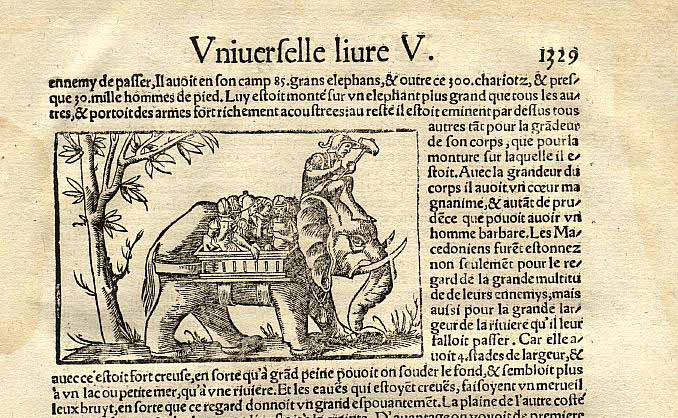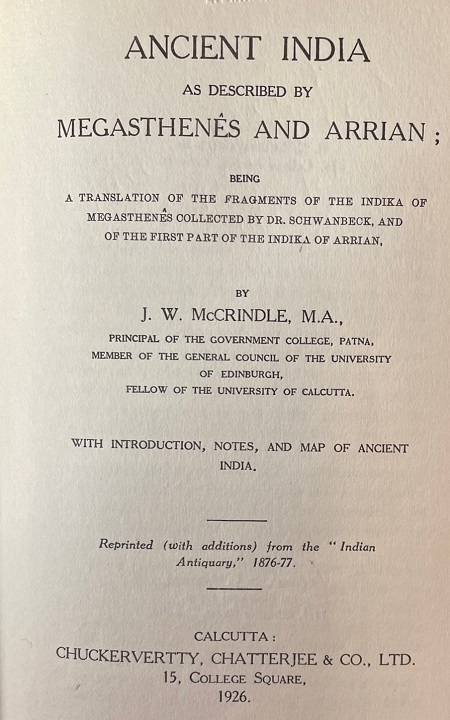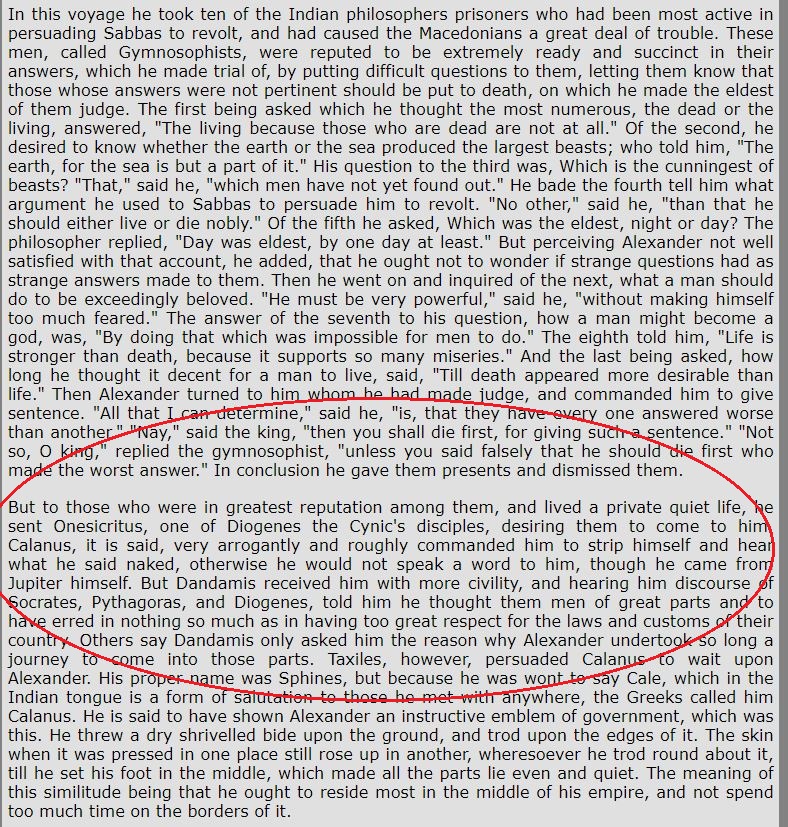Shortly after Alexander the Great had arrived in Taxila in northern India, he sent a messenger, Onesikritos, a disciple of the Hellenic school of Diogenes, to fetch an Indian teacher, Dandamis, a great sannyasi of Taxila. The following is an account from the early Greek historian Megasthenes who was recording much of what was going on at that time (326 B.C.).
“In 326 BC the formidable Greek-Macedonian army entered India. It was the first time Europeans and Indians first looked into one another’s faces…”


Fragments LIV and LV
PDF ![]() Files of these fragments are at the bottom of this page
Files of these fragments are at the bottom of this page
***
Fragm. LIV.
Pseudo-Origen, Philosoph. 24, ed. Delarue, Paris, i733> vol. I p. 904.
Of the Brahmans and their Philosophy.
(Cf. Fragm. xli., xliv., xlv.)
Of the Brachhmans in India.
There is among the Brachhmans in India a sect of philosophers who adopt an independent life, and abstain from animal food and all victuals cooked by fire, being content to subsist upon fruits, which they do not so much as gather from the trees, but pick up when they have dropped to the ground, and their drink is the water of the river Tagabena.
Throughout life they go about naked, saying that the body has been given by the Deity as a covering for the soul. They hold that God is light, but not such light as we see with the eye, nor such as the sun or fire, but God is with them the Word,—by which term they do not mean articulate speech, but the discourse of reason, whereby the hidden mysteries of knowledge are discerned by the wise. This light, however, which they call the Word, and think to be God, is, they say, known only by the Brachhmans themselves, because they alone have discarded vanity,|| which is the outermost covering of the soul.
The members of this sect regard death with contemptuous indifference, and, as we have seen already, they always pronounce the name of the Deity with a tone of peculiar reverence, and adore him with hymns. They neither have wives nor beget children. Persons who desire to lead a life like theirs cross over from the other side of the river, and remain with them for good, never returning to their own country. These also are called Brachhmans, although they do not follow the same mode of life, for there are women in the country, from whom the native inhabitants are sprung, and of these women they beget offspring.
With regard to the Word, which they call God, they hold that it is corporeal, and that it wears the body as its external covering, just as one wears the woollen surcoat, and that when it divests itself of the body with which it is enwrapped it becomes manifest to the eye. There is war, the Brachhmans hold, in the body wherewith they are clothed, and they regard the body as being the fruitful source of wars, and, as we have already shown, fight against it like soldiers in battle contending against the enemy. They maintain, moreover, that all men are held in bondage, like prisoners of war, to their own innate enemies, the sensual appetites, gluttony, anger, joy, grief, longing desire, and such like, while it is only the man who has triumphed over these enemies who goes to God.
Dandamis accordingly, to whom Alexander the Makedonian paid a visit, is spoken of by the Brachhmans as a god because he conquered in the warfare against the body, and on the other hand they condemn Kalanos as one who had impiously apostatized from their philosophy. The Brachhmans, therefore, when they have shuffled off the body, see the pure sunlight as fish see it when they spring up out of the water into the air.

Fragm. LV.
Pallad. de Bragmanibus, pp. 8, 20 et seq. ed. Londin. 1668.
(Camerar. libell. gnomolog. pp. 116, 124 et seq.)
Of Kalanos and Mandanis.
(Cf. Fragm. xli. 19, xliv., xlv.)
They (the Bragmanes) subsist upon such fruits as they can find, and on wild herbs, which the earth spontaneously produces, and drink only water. They wander about in the woods, and sleep at night on pallets of the leaves of trees.
“Kalanos, then, your false friend, held this opinion, but he is despised and trodden upon by us. By you, however, accomplice as he was in causing many evils to you all, he is honoured and worshipped, while from our society he has been contemptuously cast out as unprofitable. And why not ? when everything which we trample under foot is an object of admiration to the lucre-loving K a 1 a n o s , your worthless friend, but no friend of ours,—a miserable creature, and more to be pitied than the unhappiest wretch, for by setting his heart on lucre he wrought the perdition of his soul! Hence he seemed neither worthy of us, nor worthy of the friendship of God, and hence he neither was content to revel away life in the woods beyond all reach of care, nor was he cheered with the hope of a blessed hereafter: for by his love of money he slew the very life of his miserable soul.
“We have, however, amongst us a sage called Dandamis, whose home is the woods, where he lies on a pallet of leaves, and where he has nigh at hand the fountain of peace, whereof he drinks, sucking, as it were, the pure breast of a mother.”
King Alexander, accordingly, when he heard of all this, was desirous of learning the doctrines of the sect, and so he sent for this Dandamis, as being their teacher and president.
Onesikrates was therefore despatched to fetch him, and when he found the great sage he said, “Hail to thee, thou teacher of the Bragmanes. The son of the mighty god Zeus, king Alexander, who is the sovereign lord of all men, asks you to go to him, and if you comply, he will reward you with great and splendid gifts, but if you refuse will cut off your head.”
Dandamis, with a complacent smile, heard him to the end, but did not so much as lift up his head from his couch of leaves, and while still retaining his recumbent attitude returned this scornful answer: —“God, the supreme king, is never the author of insolent wrong, but is the creator of light, of peace, of life, of water, of the body of man, and of souls, and these he receives when death sets them free, being in no way subject to evil desire. He alone is the god of my homage, who abhors slaughter and instigates no wars. But Alexander is not God, since he must taste of death ; and how can such as he be the world’s master, who has not yet reached the further shore of the river Tiberoboas, and has not yet seated himself on a throne of universal dominion? Moreover, Alexander has neither as yet entered living into Hades, nor does he know the course of the sun through the central regions of the earth, while the nations on its boundaries have not so much as heard his name.
If his present dominions are not capacious enough for his desire, let him cross the Ganges river, and he will find a region able to sustain men if the country on our side be too narrow to hold him. Know this, however, that what Alexander offers me, and the gifts he promises, are all things to me utterly useless ; but the things which I prize, and find of real use and worth, are these leaves which are my house, these blooming plants which supply me with dainty food, and the water which is my drink, while all other possessions and things, which are amassed with anxious care, are wont to prove ruinous to those who amass them, and cause only sorrow and vexation, with which every poor mortal is fully fraught. But as for me, I lie upon the forest leaves, and, having nothing which requires guarding, close my eyes in tranquil slumber ; whereas had I gold to guard, that would banish sleep. The earth supplies me with everything, even as a mother her child with milk. I go wherever I please, and there are no cares with which I am forced to cumber myself, against my will. Should Alexander cut off my head, he cannot also destroy my soul. My head alone, now silent, will remain, but the soul will go away to its Master, leaving the body like a torn garment upon the earth, whence also it was taken. I then, becoming spirit, shall ascend to my God, who enclosed us in flesh, and left us upon the earth to prove whether when here below we shall live obedient to his ordinances, and who also will require of us, when we depart hence to his presence, an account of our life, since he is judge of all proud wrong-doing ; for the groans of the oppressed become the punishments of the oppressors.
“Let Alexander, then, terrify with these threats those who wish for gold and for wealth, and who dread death, for against us these weapons are both alike powerless, since the Bragmanes neither love gold nor fear death. Go, then, and tell Alexander this: ‘Dandamis has no need of aught that is yours, and therefore will not go to you, but if you want anything from Dandamis come you to him.”
Alexander, on receiving from Onesikrates a report of the interview, felt a stronger desire than ever to see Dandamis, who, though old and naked, was the only antagonist in whom he, the conqueror of many nations, had found more than his match.